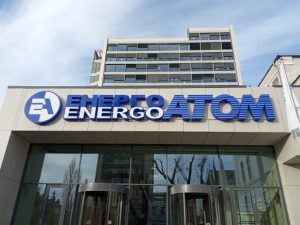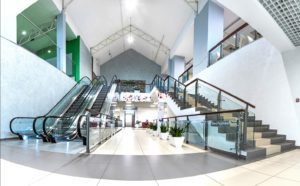
Acting President of National Nuclear Generation Company Energoatom Petro Kotin and the H2 company have signed a memorandum of cooperation on the construction of a computing data center near Zaporizhia Nuclear Power Plant (NPP), the press service of Energoatom said on Thursday, August 20.
According to the press service, the data center will become one of the largest in Europe, and the investment will amount to $700 million.
The press service reported that the document signing took place in presence of President of Ukraine Volodymyr Zelensky during his working trip to Zaporizhia region.
In turn, PrJSC Ukrhydroenergo during the same visit of the president announced the signing of a memorandum of cooperation with H2 LLC on the construction of a hydrogen electrolysis plant.
The expected investments in the project may amount to about EUR 300 million. The cooperation envisages “the construction of production facilities with constant electricity consumption”.
As reported, during his working trip to Zaporizhia on August 19, Zelensky attended the presentation of an action plan for the implementation of the Development Strategy of Zaporizhia region for the period until 2027, which provides, in particular, for the construction of data centers.
During a meeting with Acting Energy Minister Olha Buslavets in early August, Director of H2 LLC Andriy Zhovner and CEO of Yom Capital Ltd Walter Komarek voiced their interest in building a hydrogen plant and a data center in Ukraine.
Investors, in particular, are interested in the southern region of Ukraine, where there is a significant surplus of electricity, cooperation with NNPGC and PJSC Ukrhydroenergo.

China expects Ukraine to provide state guarantees for investing $600 million in the construction of a new unit at Sloviansk thermal power plant (TPP, PJSC Donbasenergo), Liu Jun, the adviser for trade and economic issues at the Embassy of China in Ukraine, has said.
“The Chinese side is ready to invest more than $600 million in this project, provided that the Ukrainian side provides state guarantees,” he said in an exclusive interview with Interfax-Ukraine.
Jun recalled that the investment agreement between Dongfang Electric International Corporation (DEIC) and Donbasenergo for the joint implementation of the project was signed in December 2018.
“The construction of the sixth power unit is a new serious potential joint project between Ukraine and China. I am sure that its implementation will bring great benefits for both the Ukrainian people and Chinese enterprises,” he said.
As reported, the contract between DEIC and Donbasenergo provides for the construction of power units Nos. 6A and 6B of 330 MW each at Sloviansk TPP using CFB technology (burning solid fuel in a circulating fluidized bed).
The contract price is $684.296 million. Financing for the reconstruction foresees 70% of funds of a credit from a Chinese bank.

Prime Minister of Ukraine Oleksiy Honcharuk has said he hopes that a large-scale building of roads will start on March 1, 2020.
“Since March 1, a large-scale building [of roads] to start…This year it is necessary to prepare for the most early start of the season. We, in turn, will try to complete all the procedures by this moment,” he said during a press conference Roads UA 2020 in Kyiv on Monday.
He also asked the Antimonopoly Committee of Ukraine (AMCU) to favor this.
“We know that there are certain difficulties, that someone is doing stupid things: disputes every second tender in the Antimonopoly Committee. We ask the Antimonopoly Committee of Ukraine do not accept such a model of behavior. Respond by the quick, honest work,” Honcharuk added.

Ukrainian President Volodymyr Zelensky has not ruled out that gambling licenses could be issued if there is a prospect for building a new hotel or the licenses could be issued at a lower price if a hotel expands the number of rooms. “We have five-star hotels on the market, but they are very small. So far there is no way to make a casino there. We need a test… We want hotels to be built. Perhaps if, for example, it is a boutique hotel, then maybe we will give them licenses, which should cost a little more,” Zelensky said during a press marathon on Thursday.
“If this is a very big brand hotel, we can give a license, while they build a hotel for us,” he added.
The president also said that the proceeds from the sale of licenses should go to sports, medicine or education.
As reported, the Cabinet of Ministers has prepared a bill on the legalization of gambling business, which regulates lotteries, bookmakers, poker, casinos and slot machines. At the same time, the government plans to create a special body – a commission for the development and regulation of gambling, which should be coordinated by the government. At the same time, an online gambling equipment supervision system is provided on the basis of the State Tax Service. At the same time, the bill provides for the identification of players by passport data and identification code.

Mass investment of the public in government and other securities in Ukraine would be possible only in two or three years after building the required market infrastructure, CEO of Freedom Holding Timur Turlov has said, based on the experience of operation in Kazakhstan. “In the next two to three years, we will be focused on building our infrastructure, so that we now have hundreds of thousands of people who will invest in government securities,” he said at the Expert Talk meeting organized by the European Business Association (EBA) on Wednesday.
Turlov expressed the hope that over this period, investors will accumulate experience and confidence in the securities market, and they will increase interest in risks. In his opinion, this will make it possible to bring not only domestic government loan bonds to the market, but also other more risky, but also more profitable tools.
“For the development of the market, big initiative and sufficiently long and significant investments of market players are important for the appearance of infrastructure,” Turlov said. He added that investing in investor education and financial literacy is also needed.
Based on the positive experience of entering the securities market in Kazakhstan, he said that such a retail business could cost billions of U.S. dollars in the next five or seven years, but a long planning horizon is required to build it.
Freedom Holding Corporation is an international financial holding company registered in Nevada (the United States), which shares will start trading on October 15 at NASDAQ.

Shuvar LLC (Lviv), the operator of the eponymous agricultural market, plans to start building second phase of the regional agricultural center with a total area of 26,000 square meters in 2020 sticking to the implementation of a development concept.
According to a posting on the website of the company, the market announced an architecture tender to select the best project for second phase. Architectural shops MarekArciszewski, MAManagement (Warsaw, Poland), Artik Design Bureau LLC (Lviv) and A-III Dmytro Antoniuk LLC (Kyiv) presented their projects.
The projected building will be three-story and includes, in addition to pavilions with different types of agricultural products, a retail gallery with recreation areas and craft products, a food hall with 5-10 restaurants of various cuisines and a single food hall.
The facility will be located on a plot of 20 hectares.
Shuvar LLC was created in 1991.
The participants of the limited liability company, according to the National Commission for Securities and the Stock Market, as of early 2018 were Roman Fedishyn (50.5%), Andriy Chipchar (27%), Liubov Doskoch (9.8%), Liubov Bokalo (9.6%), Natalia Fedishyn (2 , 5%), as well as Shuvar LLC (0.4%). The ultimate beneficiary is Roman Fedishyn.